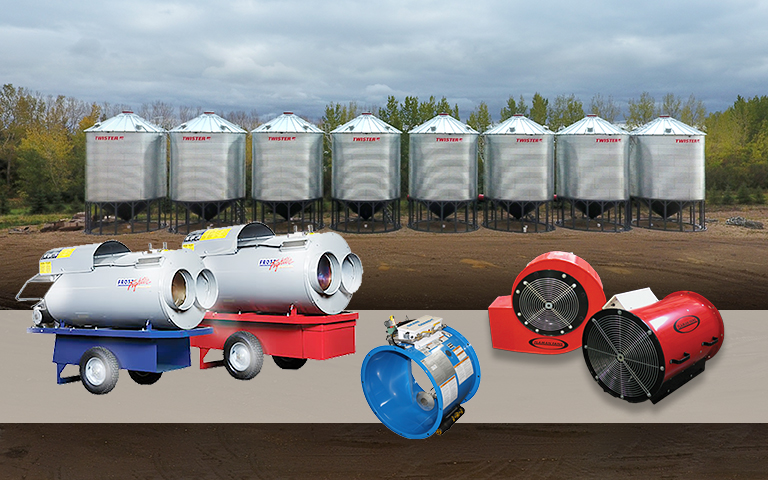(Corner of Hwy 1 & Hwy 8 North)
M: 8:00-5:00
T: 8:00-5:00
W: 8:00-5:00
T: 8:00-5:00
F: 8:00-5:00
S: 9:00-1:00
Oct 9, 2019
Harvest 2019: An unconventional way to dry your grain in wet conditions

The 2019 harvest is shaping up to be frustrating for most. It’s no secret that harvest is well behind this year, with only 34% of crops being combined in Alberta (47% 3-yr avg), 47% in Saskatchewan (75% 3-yr avg), and 71% in Manitoba (85% 3-yr avg) as of last week. Wet weather has plagued the prairies, with record rainfall in Manitoba and snowfall in southern Alberta & Saskatchewan in September. A combination of high moisture levels and widespread crop damage has contributed to diminished grade.
It’s now a race to get remaining crops off the field and although we can’t control the weather, we can help you maintain the grade of your grain by getting it dried faster and limiting spoilage. The most effective option is a NECO dryer from Flaman, which can be scaled to the size of your operation. However, dryer installs are contingent on many environmental and logistical factors and it’s far from a guarantee that a dryer purchased today would be installed before the end of harvest.
So, what does a farmer do if he or she can’t get a dryer installed in time?
Our team in Saskatchewan has heard a lot of stories from our customers who’ve resorted to unconventional methods to dry their grain. The overwhelming favourite by local farmers has been the Frost Fighter (available only at our Saskatchewan locations), which is a diesel-powered 350,000 BTU industrial heater designed to heat remote construction sites and shops. As it turns out, they are also easily adaptable to a bin aeration system and can pump heat into two bins simultaneously. It’s been a lifeline given the soggy conditions.
Kelly Stewart, the operations manager at our Flaman Moosomin location, was the man who made this idea a reality:
“I saw a video a couple years ago of an Alberta farmer using a similar method and he claimed it worked like a charm. It inspired me to try it out given how wet it’s been this year. Some local farmers put it to work and were extremely pleased with the results. It’s not a perfect solution and we know it’s not recommended by the manufacturers, but desperate times have forced us to think outside the box.
With a little extra work, moving your grain around and monitoring your moisture levels closely, we’ve heard from many happy customers that have seen up to 30,000 BU dried in a week. Obviously, the best way to dry your grain is with a dryer but given how wet it’s been and with more precipitation in the forecast, this has been a great makeshift way to salvage what has been a tough harvest.”
Interested in learning more about grain drying? Talk to one of our agriculture specialists at your nearest Flaman location.
Posted by: Paul Boechler
Category: Ag news


 Rentals
Rentals
 Locations
Locations
